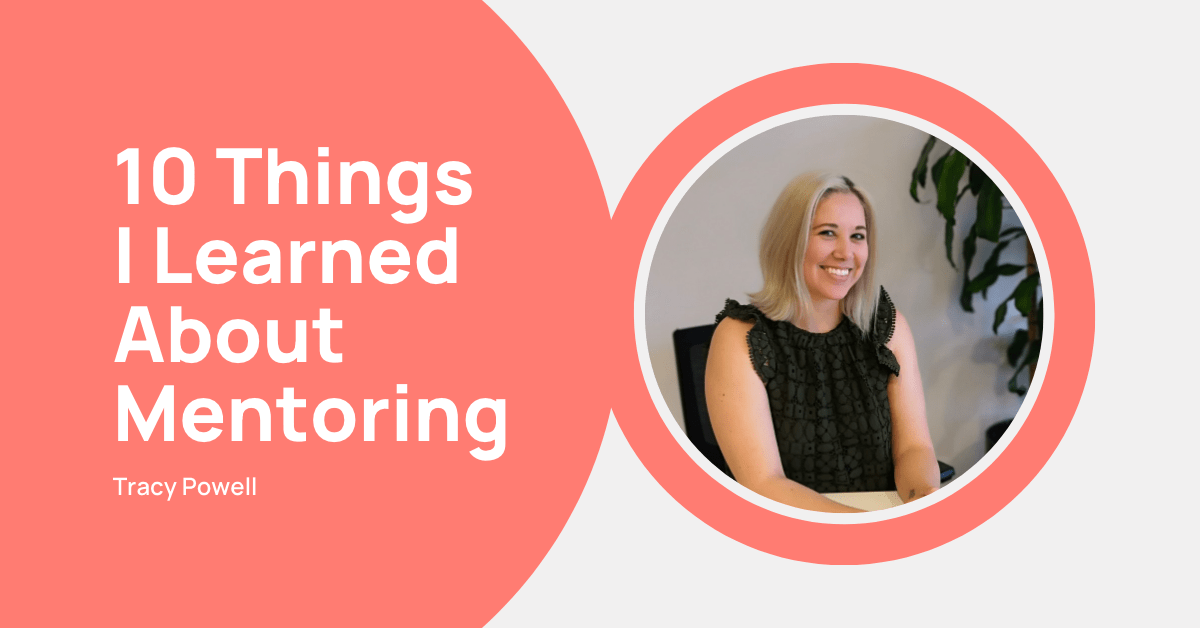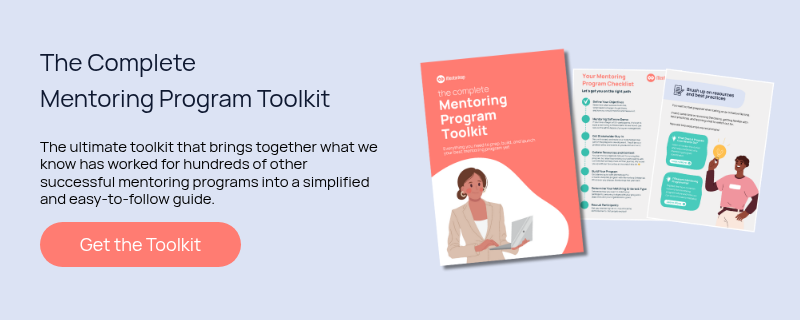Mentorloop’s Head of Engineering, Tracy Bongiorno, shares mentoring lessons and advice from her continuing mentoring journey.
I have had the opportunity to work with a wide range of mentors and mentees, both as a member of the Mentorloop team and in my previous roles. Through these experiences, I‘ve learned a great deal about mentoring and mentoring relationships. In this blog post, I’d like to share the top 10 things that I have learned about mentoring. I hope that you find these insights useful and informative, whether you’re a mentor, a mentee, or simply someone who is interested in learning more about mentoring.
1. Mentoring is not as hard or scary as you might think.
When you’re on the lookout for a mentor, you might wonder: Who would want to mentor me? Am I imposing on someone by asking them to be my mentor? How do I approach someone to be my mentor? Does asking for help mean I’m already failing?
You may hesitate too if you’re approached or have the opportunity to be a mentor. Do I have enough time? What do I have to offer? What if the relationship fails or I can’t help them?
These worries and fears are all very natural and can be overcome with preparation, reflection, and open communication. It’s important to remember that mentoring is a rewarding experience for both the mentor and mentee. Most people are happy to offer help if they can, and if not, point you in the direction of someone else who might be able to help.
To find and ask someone to be your mentor, I’ve found it helpful to identify why you’re looking for a mentor and what you’re wanting to achieve (more on this later). Having a clear “why” helps paint a picture of the mentor who is best placed to help you and have an impact on your life and career. Additionally, it’s good to remember that asking for help is a strength, not a weakness. No one needs to go it alone and there are many people in your discipline whom you can learn from.
Remember that the time you commit to mentoring is what you make it. You don’t have to be anxious about the time commitment you need to make. You and your mentoring partner should agree on how often to catch up, for how long, and what each of your expectations are for the relationship.
And don’t be scared of not being “good enough” for a mentoring relationship. You have more to offer than you think you do (we’ll get into this later) and a mentoring relationship that doesn’t get off the ground isn’t a reflection on you. It could be a fundamental difference in personalities or something else entirely that has nothing to do with you.
2. You have more to offer than you think you do.
Mentoring is a valuable experience for both the mentor and the mentee. The mentor can impart their knowledge and skills while also learning and growing from the experience of teaching and helping others. Furthermore, everyone has unique experiences, perspectives, and insights that can be beneficial to others, making anyone capable of being a great mentor.
Imposter syndrome is a common experience and accepting it as a normal part of the self-doubt that many people face can help reduce its impact. Volunteering as a mentor can help you focus on your experience, accomplishments, and strengths, helping you overcome your feelings of self-doubt.
3. The key to finding the right mentor is having a goal.
Before you can find the right mentor, you need to have a clear picture of what you want to achieve. Is it a skill you are looking to learn? Something you are looking to challenge yourself in? Or is it picking the brain of someone who walked a path similar to the one you are on?
SMART goals can help narrow down the field of candidate mentors. If you have many goals, you don’t have to find the one mentor to rule them all. You can build a personal advisory board made up of all the different types of mentors you surround yourself with.
You’ll have access to more people with different perspectives and lived experiences by connecting with more than one mentor. There’s more than one type of mentor and more than one type of mentoring goal.
Your personal advisory board may include a more traditional “master mentor”, a reverse mentor – someone more junior who can help you adjust to technological and cultural shifts, a peer mentor (more on this coming up), a cheer squad mentor – someone to encourage and support you every step of the way, or a subject matter expert mentor – someone with loads of experience in a field or topic you’d like to learn more about or become an expert in yourself.
4. Great insights can come from someone just 3 months ahead of you.
I’ve seen that the greatest insights can come from colleagues at the same level or just a few months ahead. Mentors who are just that slight bit ahead tend not to have that long-term survivorship bias (where they always made the right decisions and everything went swimmingly). Instead, they’re still grappling with the reality that they could be making the wrong choices. The obstacles and issues they’ve recently dealt with are still fresh in their mind so they can better speak to their experiences and the tools they used to push through the challenges. This can be very comforting. You can feel like you’re both in the same boat and you can help and motivate each other through it.
5. A mentor shares perspective and experience, not advice.
As a mentor, you have a limited view of the situations and challenges that your mentee may be facing. It’s important to remember that what might have worked for you in a similar situation may not work for your mentee.
Sharing your experiences as a mentor helps drive the exchange of ideas and discussions regarding different experiences. You can guide your mentee through an exploration of different perspectives that may give them a different viewpoint on their situation.
It can also help your mentee keep an open mind when faced with new challenges. Understanding how different people approach tasks helps identify new strategies and techniques that can be used in the future. Additionally, it can help build trust between the mentor and mentee.
6. When left to run organically, mentoring favors the bold.
A company or organization with a mentoring culture that is left to run organically ends up leaving people out of the process. When there are no structures in place to get others involved, those that participate are those who are bold. The ones who find mentorship are those who aren’t afraid and have the confidence to ask for help, who think they deserve every opportunity, and often those who already have great networks. And while it’s great that these individuals are constantly looking to better themselves, the ones who need the help the most can end up missing out.
Having structure and tools in place to include everyone is important for that any group wanting to build a great, inclusive culture of mentoring. At Mentorloop, we are bringing these tools and resources to companies, communities, NFPs, and industry bodies all over the world to help make mentoring better, more scalable, and accessible to everyone.
7. Mentoring is a two-way street – the mentor gets value out of it too.
The 1-on-1 nature of a reciprocal relationship lets each party see the world from a different point of view. Reciprocal mentoring challenges biases and gives way to new perspectives. It celebrates contributions from less experienced individuals and grows leadership skills.
The give and take in reciprocal mentoring enables you to learn and be inspired, sometimes from the most unlikely connection. All experience levels – from the engineering intern to the CEO – can benefit from holding roles as both mentors and mentees.
And perhaps the biggest win for juniors – reciprocal mentoring offers unparalleled access to senior leaders. The opportunity to build rapport with executives means exposure to new parts of the business. It also means mentees get advice on pathways to career ascension (vertical or lateral). Best of all, mentees get invaluable access to networks that expand one’s circle of influence. All of this is good for their personal brand and career.
8. It doesn’t have to be formal – mentoring comes in all shapes and sizes.
You may have found informal mentorship by catching up to discuss the latest trends and challenges in your industry with a friend, colleague, or like-minded group of people. Or perhaps you even have an avenue within your industry community for micro-mentoring – catching up with a mentor for one, maybe two sessions to work through a specific challenge you’re facing. Or you may have a mentor or mentee via a more traditional route – reaching out directly for mentorship or joining a mentoring program.
No matter how your mentoring relationship came to be, it’s important to ensure that your mentoring relationships stay fruitful. And if needed, make sure to close them out effectively. This brings me to the next point…
9. Mentoring relationships don’t have to continue forever.
After spending quality time with a mentoring partner, inevitably the time will come when the relationship comes to a close. It could be because the mentee has achieved their goals or the mentor’s experience and perspective for the mentee’s goal is mostly exhausted.
Part of the mentee process is to ensure you close this mentoring chapter effectively and open as many new ones as possible. This involves maintaining a good relationship and ensuring that your valued mentor becomes a part of your personal advisory board. Most mentors are happy to be reached out to during decisive moments of their mentees’ careers.
Remember to reflect with gratitude. While you’re in the middle of it, it may be difficult to see how all the incremental changes add up. But at the end, you can reflect on where you were at the start to see the full impact of your mentoring relationship. And if you hear a mentor’s advice in your head down the track, reach out to them! They would love to know their contribution continues to make a difference.
As a mentor, offer to continue to be there when you are needed. Think about if there is another mentor who you could pass your mentee on to for even more progress. And don’t forget to make the mentee feel good about their efforts by recognizing how much they have grown.
10. Mentorship gives rise to sponsorship.
A mentor is someone who shares their experience and perspective. A sponsor, however, is someone who puts your name forward for opportunities or recognition. Throughout a mentoring relationship, the mentor and mentee can develop a strong bond, understand each other’s strengths, and even see growth and reflection occurring.
Once a mentor comes to know and trust their mentee, they’re in a great position to sponsor them. They can do this by mentioning them to others in the company or industry, suggesting them for available opportunities like new projects or open roles, and connecting them with others in the industry to advance the mentee’s career and network. In this way, a fruitful mentoring relationship naturally lends itself to a sponsoring opportunity.
And those are the 10 things mentoring lessons and advice I’ve collected throughout my career. I hope you find these helpful in your own mentoring relationships or inspire you to begin your mentoring journey.






